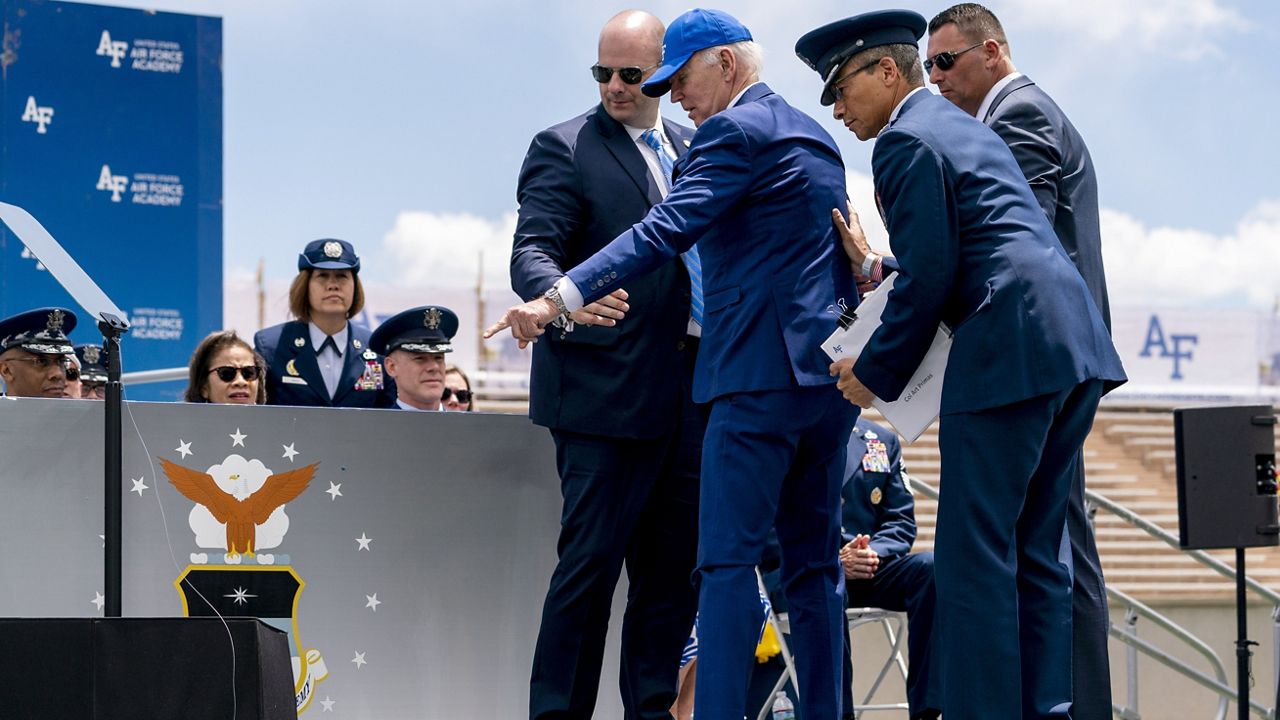President Joe Biden was in Colorado Thursday to deliver a commencement speech for the U.S. Air Force Academy, heralding the newly commissioned Air Force and Space Force officers as the future of American military dominance in each branch’s respective domains.
As he was handing out diplomas, the president took a hard fall onto his hands and knees. He tripped on a sandbag and is "fine," according to White House communications director Ben LaBolt.
What You Need To Know
- President Joe Biden was in Colorado Thursday to deliver a commencement speech for the U.S. Air Force Academy
- As he was handing out diplomas, the president took a hard fall onto his hands and knees, tripping on a sandbag
- Biden quickly got back on his feet and took his seat, smiling. A White House official said "he's fine"
- In his speech earlier in the ceremony, the president warned of the challenges the U.S. military will face as the 21st century rolls on: “Russia’s aggression and brutality,” competition with China, food insecurity, climate change, and artificial intelligence
Biden quickly got to his feet with the help of three men and returned to his seat where he smiled and pointed in the direction of where he tripped.
“He’s fine,” Labolt tweeted. “There was a sandbag on stage while he was shaking hands.”
When he returned to the White House later Thursday, Biden joked: "I got sandbagged!"
In his speech earlier in the ceremony, the president warned of the challenges the U.S. military will face as the 21st century rolls on: “Russia’s aggression and brutality,” competition with China, food insecurity, climate change, and artificial intelligence.
“Emerging technologies, from AI and 3D printing, that could change the character of conflict itself. It’s not going to be easy decisions guy,” Biden said in front of the over 900 graduates and top Air Force brass, including the Chief of Staff General Charles “CQ” Brown Jr., the president’s nominee to serve as the next Chairman of the Joint Chiefs of Staff, the most senior position in the military.
Biden said he met in the Oval Office with “eight leading scientists in the area of AI. Some are very worried that AI can actually overtake human thinking, so we've got a lot to deal with.”
In February, the State Department announced a non-legally binding declaration that laid out principles for “responsible military use of artificial intelligence and autonomy,” amid warnings from Ukrainian officials that Russia may begin to use fully autonomous drones to kill combatants.
A year prior, then-Lt. Gen. Micheal Kurilla told the Senate Armed Services Committee that AI was “the next revolution in military affairs.” Kurilla now leads U.S. Central Command, overseeing military operations in the Middle East and parts of Central Asia.
Many of the world's largest arms manufacturers — including companies that receive tens of billions of dollars from the Pentagon like Lockheed Martin, Raytheon Technologies and Northrop Grumman — are marketing AI products.
Also known as “ghost guns” for their difficulty to trace, 3D printed weapons have spread rapidly, including into the hands of rebels in Myanmar.
In his speech, Biden also highlighted the Air and Space Forces’ role as “the backbone” of the United States’ effort to provide supplies and weapons to the Ukrainian war effort.
“No other nation in the world, the whole word, has the enabling capacity we do to do what we have to do,” he said.
Biden also warned of threats not from any military rival, but from climate change. The scope of the global problem worsens food insecurity and natural disasters and requires the United States to work with potential adversaries like China, he argued.
“The United States does not seek conflict or confrontation with China,” Biden told the incoming officers. “China, the United States should be able to work together where we can solve some global challenges like climate. But we are prepared for vigorous competition."



